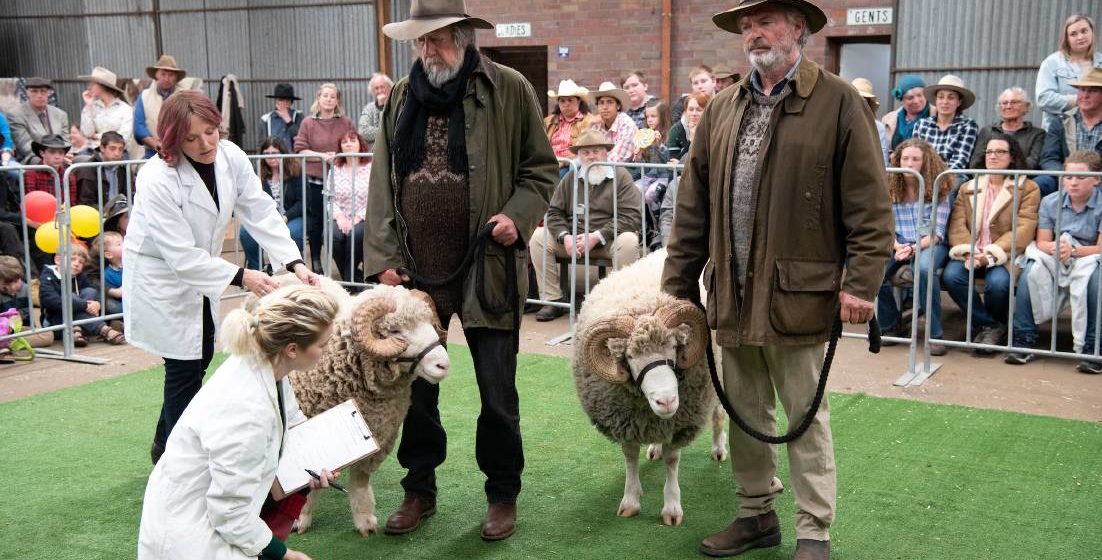Rating: ***
It takes only 20 seconds into Jeremy Sims’ Rams to realise this is a different film from the Icelandic film that won the prestigious Un Certain Regard in Cannes Film Festival a little over five years ago. The story remains the same, give or take a couple of elements that Sims changes for (I assume) dramatic value, but it’s more than just a mere reinterpretation. In its place is something less cinematic, more straightforward, visually not as compelling but easier to digest. Even the genres are different: where the original was a whimsical drama, the remake also tries to be a comedy with hints of romance. It’s also not as good, but there is something to take from it.
Replacing the frosty hills of Iceland with the arid valley of Western Australia, Rams follows two estranged brothers, Colin (Sam Neill) and Les (Michael Caton), whose livelihood revolves around a rare breed of sheep. When a lethal disease is found in the area, the government orders every sheep to be removed and safely slaughtered. Colin, the resourceful brother, hides a couple of ewes and one ram in his house with a plan to keep them there during the two years they are being forced to quarantine.
From the synopsis, it’s exactly like Grímur Hákonarson’s groundbreaking film, but it’s all the padding that Sims and screenwriter Jules Duncan add between the lines that make the difference. They populate the small country town with a group of characters who are never given more than just a couple of lazy traits and, in one damning case, a very weak romantic subplot.
Miranda Richardson plays the British vet with a shine to one of the brothers, but again most of that is inconsequential to both the story and the world around it. And that seems to be the biggest flaw of this new version. There’s a strange safety in this story that the original so dauntingly opposed. It ticks every box on how to create a crowd-pleaser without having to make the effort of surprising that same crowd.
As a consequence, the film is not nearly as compelling and dramatic as the original was, and fails to yank a lasting emotion, even in the most dramatic moments.
What it does well is create a genuine picture of real Australiana. Without trying to romanticise the simple farm life or whitewash it for our urban sensitivity, Sims draws from experience to portray the world as close to reality as he can. It’s all dirty, dusty and purposely not well designed. Even a competition at the start of the film has the same sincerity you find in any other rural show if you’ve ever been to one. So when Paul Kelly or Slim Dusty plays in a little FM radio, it feels true, because I know they’re always on little FM radios all across the country.
That attention to detail elevates the film a couple of steps, especially as it deals with problems rural Australia is currently facing, from the exodus of its population to rampant fires. One entire sequence revolves around fighting a threatening bushfire and while it doesn’t seem to serve a dramatic purpose that couldn’t have been resolved any other way, it mirrors something unique and inherent to that place.
It could be that Sims just needed a bit of confidence, and Duncan a couple of rewrites, to make Rams a noteworthy piece. Both main actors are great, especially Caton who proves once more that he deserves the same treatment Richard Jenkins received, but neither the script nor Sims’ uninspiring directing keep up with their pace.
Those were some big shoes to fill, Hákonarson is a fantastic director with an acute visual sense who let his story indulge in the tragedy it deserves. Sims, as effective as he is, shoots like he’s working in TV and couldn’t stop himself from leaving us with a happy ending we didn’t even ask for. So it’s fine. Harmless, forgetful, but fine.
Rams is now showing in selected cinemas.




